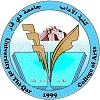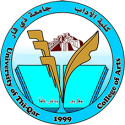Journal of College
Thi-Qar Arts Journal is a is a scientific academic and accredited peer-review published by the College of Arts, University of Thi-Qar on a regular basis and within specific dates every three months, with four issues each year, distributed over the months of March, June, September and December. The first issue of the Journal was published in January 2010. The Journal specializes in publishing researches related to human studies in the fields of language, literature, criticism, history, geography, sociology, psychology, philosophy, antiquities, media, and law. The journal seeks to spread the culture of discreet scientific publishing and its best ethical practices because it occupies a distinguished pioneering position in the Iraqi culture movement because it is associated with the University of Thi-Qar, the descendant of the first human civilization known to mankind, to become a knowledge space that radiates its originality and valuable products in various fields of knowledge, reaching the highest standards in publishing ethics, including enhancement of the researchers’ confidence in preserving their knowledge achievements and motivates them to give more in light of that civilized space rooted in originality and knowledge creativity. .
Aims and Scope
Thi-Qar Arts Journal is a is a scientific academic and accredited peer-review published by the College of Arts, University of Thi-Qar. The Journal seeks to:
1- spread the culture of discreet scientific publishing and its best ethical practices.
2- ensure the integrity of the scholarly record and the publication process .
3- Apply the principles of transparency in Scholarly Publishing.
4- promoting accessibility, diversity, equity, and inclusivity in all aspects of the Scholarly Publishing.
Scope of journal : Humanities.
.Open Access Statement
Thi Qar Arts Journal (TQARTJ) publishes open-access articles, which means that all articles are available on the internet to all users immediately upon publication. The TQARTJ publisher and editor are always willing to publish corrections, clarifications, retractions, and apologies when needed. All articles published in the TQARTJ are fully open access; immediately freely available to read, download and share. Articles published in the TQARTJ are under the terms of a Creative Commons license 4.0 (CC-By), which permits users to read, print and download, or redistribute, translate the article, download for text and data mining purposes, reuse portions or extracts from the article in other works. Benefits of open access for authors include:
- Free access for all users worldwide
- Authors retain copyright to their work without restrictions
- Increased visibility and readership
- Rapid publication
- No spatial constraints
The journal adopted an open access policy on June 19, 2012, after archiving the first issue of the magazine on the Iraqi Scientific Journals website, which is affiliated with the Iraqi Ministry of Higher Education and Scientific Research.
- link Archive date on the website Iraqi Scientific Journals
- link Open Access policy in Iraqi Scientific Journals
Guidance
Below are the most important links that help researchers publish their research and identify reputable scientific journals in major international publishing houses suitable for their research:
Here are the important links:
- To find journals in the SCOPUS database:
Visit this link: https://www.scopus.com/home.uri
- To find journals in the Clarivate Analytics database:
Visit this link: http://mjl.clarivate.com
- Link to the predatory journals website:
Some predatory publishers take advantage of researchers’ need to publish in international scientific journals quickly. They create websites for fake journals with prestigious names to attract as many victims as possible for publication in exchange for hefty fees. Therefore, researchers should be cautious and look for reliable scientific journals.
Link to the predatory journals website: https://predatoryjournals.com
To clarify some terms in the list: Hijacked: List of hijacked journals Journals: List of non-reputable journals Metrics: List of predatory databases Publishers: List of non-reputable publishers
- How to verify that the International Standard Serial Number (ISSN) of a scientific journal is genuine and not fake:
Many journals may not have an ISSN initially, and these journals do not pose a problem as researchers can easily identify them. However, there are journals that provide fake ISSNs. The website below is dedicated to the International Centre for the Registration of Serial Publications, responsible for issuing these serial numbers for journals. Through this website, researchers can determine whether the ISSN is genuine or fake. The website provides detailed information about the journal, whether it is Arabic or international, and whether the number is confirmed or not. If the number is genuine, you will find the following phrase:
Type of record: Confirmed.
Website link: https://portal.issn.org
- Journal Selector website specialized in finding the appropriate journal for publication:
This website allows you to search for the suitable journal for publication. It is called Journal Selector. The website provides a range of search options such as subject, evaluation type, open access, journal review and publication speed, and other criteria.
Website link: http://cofactorscience.com/journal-selector?fbclid=IwAR2IGBPO_jTlOKrJTNqBHDnyuxNoQTVdteJWgHLlMaJPP1_xt1h9I_U9oWg
- How to find the appropriate journal for publishing your research in Elsevier and Springer:
To find the best journal for publishing your research within Elsevier and Springer’s journals, these two scientific institutions provide researchers with the opportunity to search for the appropriate journal within their databases. Researchers can enter the title and abstract of their research to be directed to the best journals that match their research topic and acceptance rate.
Elsevier’s global website: https://journalfinder.elsevier.com/
Springer’s website: https://journalsuggester.springer.com/
- How to find the appropriate journal for publishing your research:
To publish your research in a journal that suits your specialization, including all international journals, you can use the following links. The search method is not different from what is commonly done in Elsevier and Springer journals. However, these links cover all journals as mentioned.
The links are:
- JANE Biosemantics http://jane.biosemantics.org/
- Edanz Journal Selector https://www.edanzediting.com/journal-selector
- Journal Indexing Identifier application:
Journal Indexing Identifier is a distinctive application for Android devices that can be used to verify whether a scientific journal is genuine or fake by entering its International Standard Serial Number (ISSN). The application displays all the information related to the scientific journal.
Application download link: https://play.google


